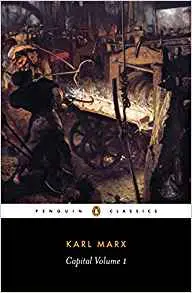
Karl Marx, Das Kapital
Marx, Karl. Das Kapital: A Critique of Political Economy. Volume One. 1867.
Review by Genevieve Carlton
Nineteenth-century economist and political revolutionary Karl Marx spent three decades writing the first volume of Das Kapital, which was published in 1867. In addition to describing the economic nature of capitalism, Marx builds a scathing critique of the Industrial Revolution into his attack on the capitalist system. Das Kapital must be understood as a product of its historical context, as Marx witnessed the rise of industrial labor, which transformed working conditions across Europe.
At its core, Das Kapital presents Marx’s theory on capitalism, including its social impact. Capitalism, structured around private profit, is inherently unstable, according to Marx. He uses the concept of “surplus value” to show the structure and function of capitalism, positing that the economic system depended on a large population of unemployed workers. Marx argued that the capitalist system extracts surplus value from workers, leaving them at barely the subsistence level. Capitalists treat labor as an exploitable commodity, divorcing workers from the products of their labor and profiting on the surplus.
Marx concludes that capitalism itself is unsustainable, positing that the “capitalist class becomes unfit to rule, because it is incompetent to assure an existence to its slave within his slavery.” Once the capitalist system collapses, the working class will inherit power, a theory Marx proposed in his 1848 The Communist Manifesto. The struggle between classes serves as a key theme in all of Marx’s works, with capitalists and workers clashing throughout history. Marx argues that capitalists often succeed in these class conflicts because socioeconomic structures favor their class––modes of production, the legal system, and the political system all serve the capitalists’ needs.
While Marx sees a fundamental class conflict at the root of history, he argues that the capitalist system will inevitably fall. Capitalism relies on the exploitation of workers––it only succeeds by skimming surplus value off of the workers’ labor. However, capitalism cannot sustain itself indefinitely, as it depends on the increasing exploitation of workers. In its later stages, Marx predicts, capitalism “grows the mass of misery, oppression, slavery, degradation, exploitation”––which leads to the revolt of the working class.
Because Marx sees the flaws in capitalism as structural, he believed that progressive efforts to protect workers through minimum wage laws or unemployment benefits cannot alleviate capitalism’s exploitative nature.
Karl Marx spent thirty years observing England’s industrial workers, particularly the ways that mechanization transformed the workplace. To Marx, these changes created an impoverished class of workers who labored under horrific conditions, in an era with few workers’ rights laws and little workplace regulation. The new working class, abused by capitalists and ignored by the political system, struggled to survive in a system designed to exploit their labor.
In Das Kapital, Marx provides a social and economic analysis to ground his political theories. His work proved extremely influential, inspiring 20th century revolutions in Russia and China. Ironically, while Marx predicted that capitalism’s overthrow would begin in the most industrial societies, his political philosophy found its clearest expression in largely agrarian countries. The Marxist philosophy also influenced 20th century thinkers and scholars, as an interpretive tool and a theoretical approach. At its core, Marxism argues that history itself is a struggle between social classes, an idea with enduring power more than 150 years after Marx published Das Kapital.
Return to the reviews or the annotated bibliography
Genevieve Carlton is an award-winning historian with a Ph.D in History from Northwestern University. In 2017, she earned tenure at the University of Louisville. Her work has been published by the University of Chicago Press and in top academic journals.